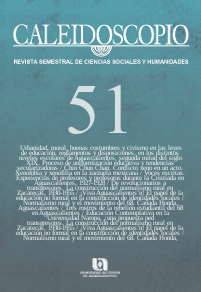Critical Notes Regarding the Representation and Mastery of the Same in Gayatri Spivak and Silvia Rivera
DOI:
https://doi.org/10.33064/51crscsh4483Keywords:
domination, exclusion, silence, resistence, ruptureAbstract
The purpose of the text is to understand through the thought of Gayatri Spivak and Silvia Rivera the ways in which capitalist and imperial modernity structures and displays its hegemony, as well as glimpse the resistances and ruptures around it. For the investigation of the thoughts of the authors, an interpretative reading has been used, both thoughts are not forced, that is, they are not made to say something that they do not suggest. Likewise, the thoughts are taken up again where they emphasize the need to break with the cultural-civilizing project of modernity, this is an exclusion machine that must be criticized and destroyed. On the other hand, with the investigation of the thought of Spivak and Rivera, it can be said that criticism in general and of the modern project in particular continue to be valid for thought and praxis, without criticism dominations are endorsed and without resistance, the hegemony decides absolutely.
Downloads
Metrics
References
Butler, J. y Spivak, G. (2009). ¿Quién le canta al Estado-nación? Lenguaje, política, pertenencia. Paidós.
Lehm, Z. y Rivera, S. (1988). Los artesanos libertarios y la ética del trabajo. Gramma.
Rivera, S. (2010a). Oprimidos pero no vencidos. Luchas del campesinado Aymara y Qhechwa 1900-1980 (4a ed.). UNRSD.
Rivera, S. (2010b). Violencias (re) encubiertas en Bolivia. Editorial Piedra rota.
Rivera, S. (2015). Sociología de la imagen. Miradas ch’ixi desde la historia andina. Tinta Limón.
Spivak, G. (2009). ¿Pueden hablar los subalternos?. MACBA.
Spivak, G. (2010). Crítica de la razón poscolonial. Hacia una historia del presente evanescente. AKAL.
Downloads
Published
How to Cite
Issue
Section
License
Copyright (c) 2024 Eduardo Solano Vázquez

This work is licensed under a Creative Commons Attribution-NonCommercial-ShareAlike 4.0 International License.
Licencia Creative Commons Atribución-NoComercial-CompartirIgual 4.0 Internacional
El lector es libre de compartir o adaptar el material en cualquier medio o formato bajo las condiciones siguientes: (a) debe reconocer adecuadamente la autoría, proporcionar un enlace a la licencia e indicar si se han realizado cambios; (b) no puede utilizar el material para una finalidad comercial y (c) si remezcla, transforma o crea a partir del material, deberá difundir sus contribuciones bajo la misma licencia que el original.
Resumen de la licencia
https://creativecommons.org/licenses/by-nc-sa/4.0/deed.es_ES
Texto completo de la licencia
https://creativecommons.org/licenses/by-nc-sa/4.0/legalcode
Cada autor es responsable del contenido de su artículo. En el caso de un texto colectivo, el primer autor asume la responsabilidad intelectual de los resultados del proceso editorial; los autores son responsables de obtener la licencia de autor para reproducir materiales gráficos o fotográficos que pertenecen a terceros.
Los autores asumen plena responsabilidad en el caso de falsificación de datos o falta de autenticidad en la investigación. Se comprometen, también, a no reutilizar trabajos ya publicados, total o parcialmente, para presentarlos en otra publicación.
Estas condiciones aplican tanto a la versión impresa como a la versión electrónica de la revista.


















